Finding the right animals for homesteading can be a trial by error for many new homesteaders. Not every common farm animal is ideal for homesteading but there are many animals that truly benefit and help ensure the success of homesteads around the world.
The best animals for homesteading are those that provide not only a source of food, but that also offer a source of income or are essential in the day to day chores that crop up.
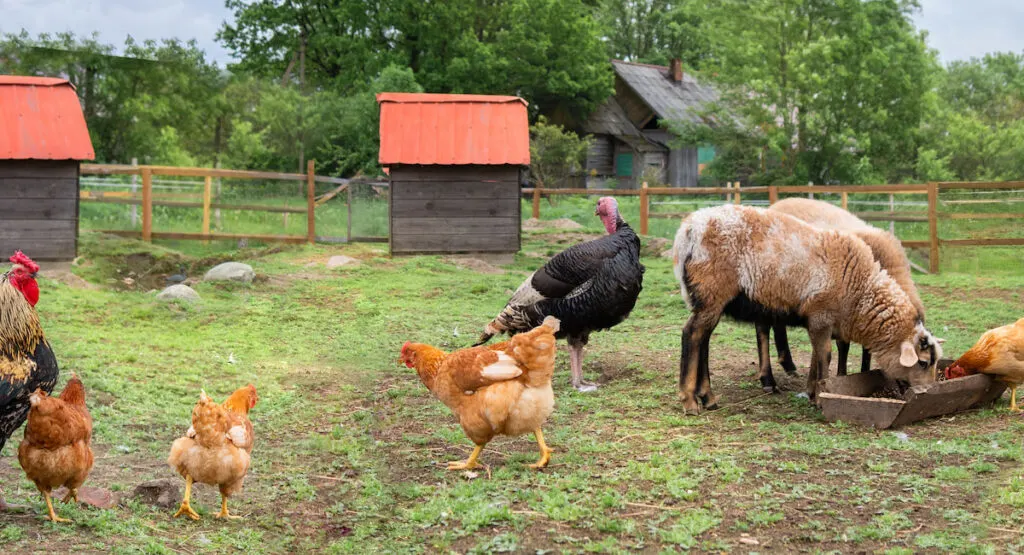
Animals are vital to the longevity of most homesteads but the wrong animals can put a strain on the lifestyle.
This is a list of the absolute best animals for homesteading and what they can offer your homestead. Some potential homestead animals are easier than raise than others, some are more profitable than others, and some are just a lot more friendly.
1. Chickens
Chickens may seem like an obvious choice for homesteads but not every homesteader is sold on the idea. Chickens are not only great for meat purposes, but the hens offer a steady source of eggs.
Chicken eggs can be used to feed homesteaders, feed other animals on the property, produce more chickens, or they can be sold for profit.
The best chickens for homesteaders are dual-purpose chickens that lay large numbers of eggs each year but are also great meat harvesters as well.
Keep in mind, their manure compost can be used to fertilize pastures as well. Chickens tend to be friendly and love to eat insects, so they will help limit the amount of ants, fleas, ticks, and other annoying bugs on your property.
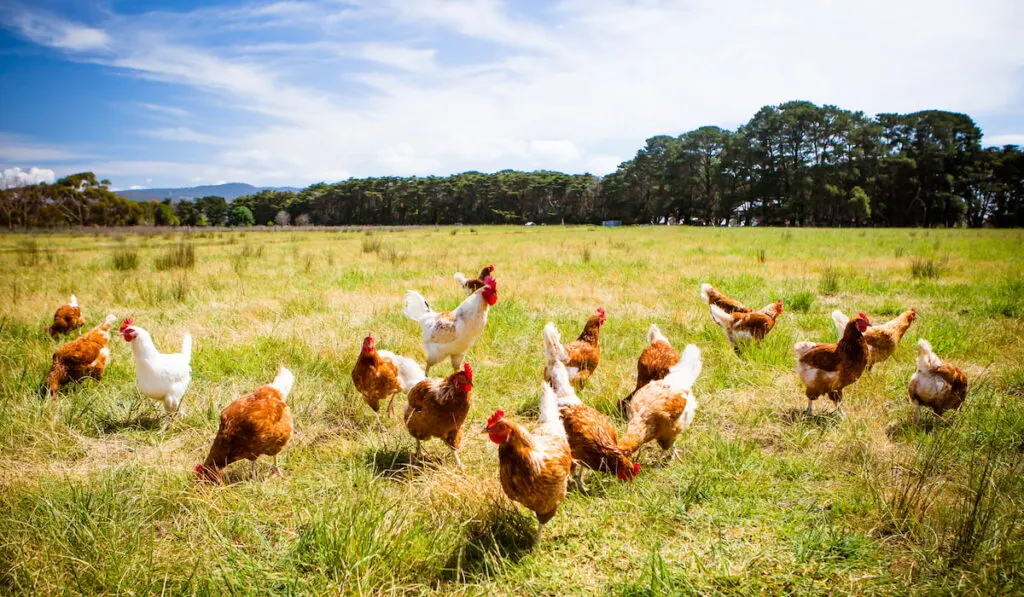
Chickens require an enclosed and sheltered area to nest and stay safe from the elements and predators, but they are overall relatively easy to house.
They will need a coop with nesting boxes so that eggs are easy to collect. Thanks to their high egg and meat production potential, chickens are one of the most profitable homestead animals that you can raise.
2. Ducks
Ducks are great additions to homesteads. Ducks produce large eggs and are a great source of meat.
Homesteaders can raise ducklings, eat the eggs, harvest the ducks for their meat, and even sell or trade the eggs and ducks to neighbors.
Ducks do need water access, but they only need enough to clean off in each day, they do not need an entire pond. They do not require a lot of daily care and they do not need raised nesting boxes like chickens.
Ducks are usually friendly and do not tend to cause problems for their owners.
Ducks will do great in a small shelter like a dog house or small duck house and they prefer their nests on ground level.
They eat insects, stay out of your garden, and tend to stay out of your way. Ducks should not be housed in the same coop as chickens but they can be nearby.
3. Turkeys
Turkeys make excellent additions to most homesteads but they do eat more than chickens and require a little more space.
They are ideal for meat production because they grow relatively quickly and they are so large they offer a tremendous amount of meat for the homestead.
Turkeys do require adequate housing to keep them safe from predators and the elements.
Turkeys should not be left to roam around the homestead and require fencing as well as slightly raised nesting boxes. They can be kept in the same coop as your chickens.
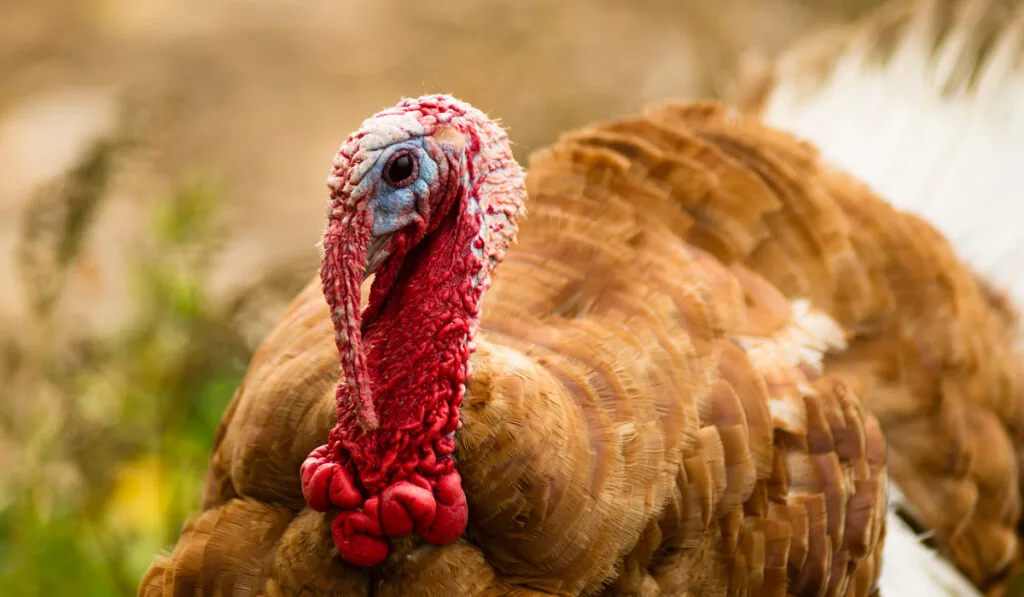
Turkeys are not only great for meat production but they also lay eggs, just not like a chicken does. Eggs can be used to produce more turkeys, if you have a male and female, or they can be eaten or fed to other animals.
Turkey eggs and young turkeys can be sold or traded to other homesteaders as well, so they are moderately profitable.
4. Goats
Goats are a top choice for many homesteaders across the country because they are easy to raise and profitable.
The right goats can produce large quantities of milk which can be used for drinking as well as to make butter, cheese, cream, ice cream, soap, and more!
Goats can also be a great supply of meat. Beyond food, goats will also help clear your land of brush and weeds, as it is their favorite food to eat!
They are relatively easy keepers, but they do require a fenced area as well as an enclosed shelter to keep them safe from the elements.
Goats can also be used to produce and raise more goats, a great profitable commodity for any homestead.
Their milk and milk-products like cheese and soap can be sold for profit as well, making them a tremendous potential profit-maker for the homestead.
5. Sheep
Sheep, like goats, are fun to raise and offer more than just meat to the homestead. Sheep can be used to clear land of weeds and grass.
They also produce meat, milk, and wool! Sheep milk can be used for a variety of marketable food products including cheese and yogurt.
Sheep wool can be sold to other farms, used for making clothing, insulation, linen, bedding, and other materials needed around the homestead.
It can also be sold or used as a product to trade with other homesteaders or neighbors. It can even be used as mulch for a garden!
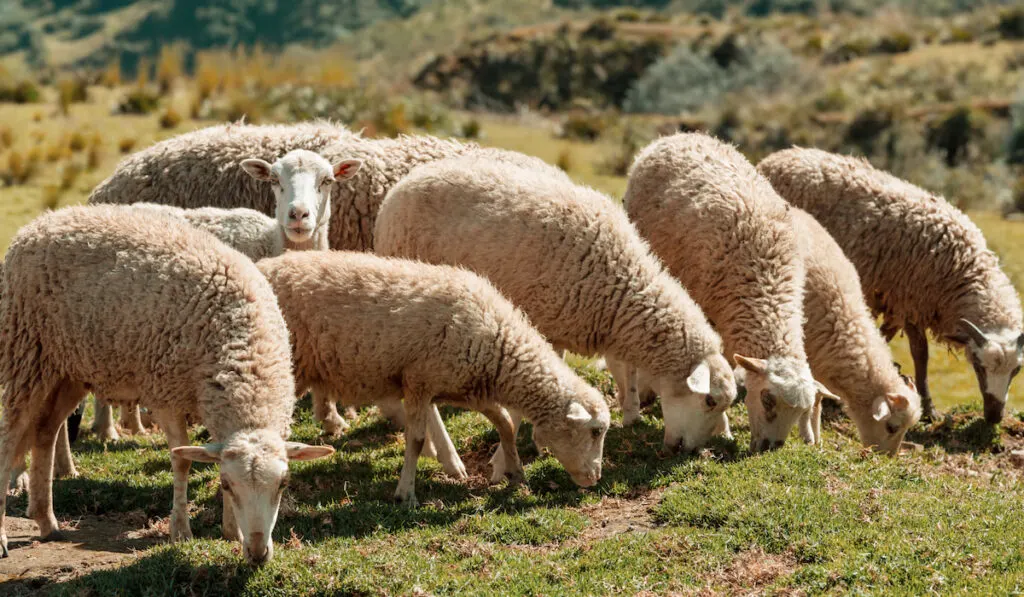
Sheep can live off of pasture grass and roughage as well as hay and supplemental feeds if necessary. They do require a shelter to keep them safe from the elements but they will not need it all the time.
Sheep do require regular shearing of their wool to keep them safe from parasites and from overgrowth.
6. Cows
Cows are great for homesteads because they can produce so much for their owners. Cows can provide milk as well as meat for homesteaders.
A dairy cow’s milk can be drank by homesteaders or used to make sellable as edible butter, cheese, cream, buttermilk, sour cream, yogurt, ice cream, and more!
Cows are a fantastic source of meat, especially beef cows that are breed specifically for their meat production.
A 1200 pound cow can produce almost 500 pounds of meat for a homestead or to sell for a profit. Calves can be raised on the farm or sold when weaned for a profit as well.
Cows are relatively easy keepers as long as there is an adequate fence and a significant amount of pasture. It is beneficial to have an enclosed barn or shelter to house calves, birthing mothers, and to treat injuries or other medical issues.
7. Rabbits
Rabbits make great homestead additions because they are not only an excellent source of meat, can be a great money producer as well.
They require a shelter, but it does not have to be super fancy. They just need to be safe from predators, separated from one another, lifted off the ground, and protected from the elements.
Rabbits can be used for their meat or for their wool, depending on the breed. They are small, so they are easy to handle, tend to be friendly, and reproduce like crazy.
Thanks to their fur, pelts, meat production, and reproduction potential, rabbits could potentially be a top money maker for your farm.
8. Pigs
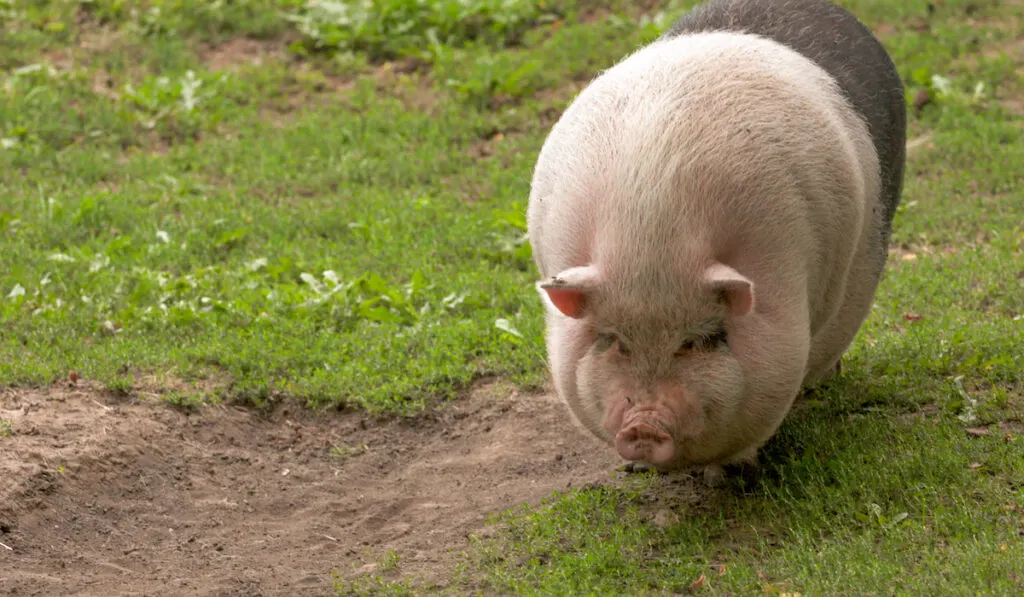
Pigs are a staple for many homesteads because they provide a great source of meat and they grow quickly.
They are also easy to feed as they will eat almost anything on the farm including eggs, vegetables, grass, corn, bread, and hay.
Pigs can be housed in barns or allowed to free range in pastures, although catching them will be more difficult.
Pigs reproduce extremely well and produce relatively large litters. Piglets can be raised for more meat or sold to other farms for income. Pig meat is used to make pork chops, Boston butts, pork ribs, bacon, ham, livermush, and fatback.
Pigs are sometimes not the friendliest animals on a homestead and they have been known to bite or run their owners over occasionally. Male pigs do require castration if they are intended to be harvested for meat.
9. Donkeys
Donkeys are not always the friendliest animals, but this is a part of their draw.
Donkeys can be used as guard animals for smaller livestock like sheep and goats. They will stand their ground and protect their pasture from predators.
Donkeys also can be used as pack animals on a homestead to carry materials around the property. They do not require gas or electricity to power them and they can carry a substantial amount of weight.
If trained properly, pack donkeys can be easily handled and even ridden in the right conditions.
Donkeys usually only need a covered shelter to get out of the elements, but they can spend most of their lives in an open pasture.
Donkeys are not used for meat production and most homesteads will just a need a couple of donkeys, if that many, on the property at one time.
10. Llamas
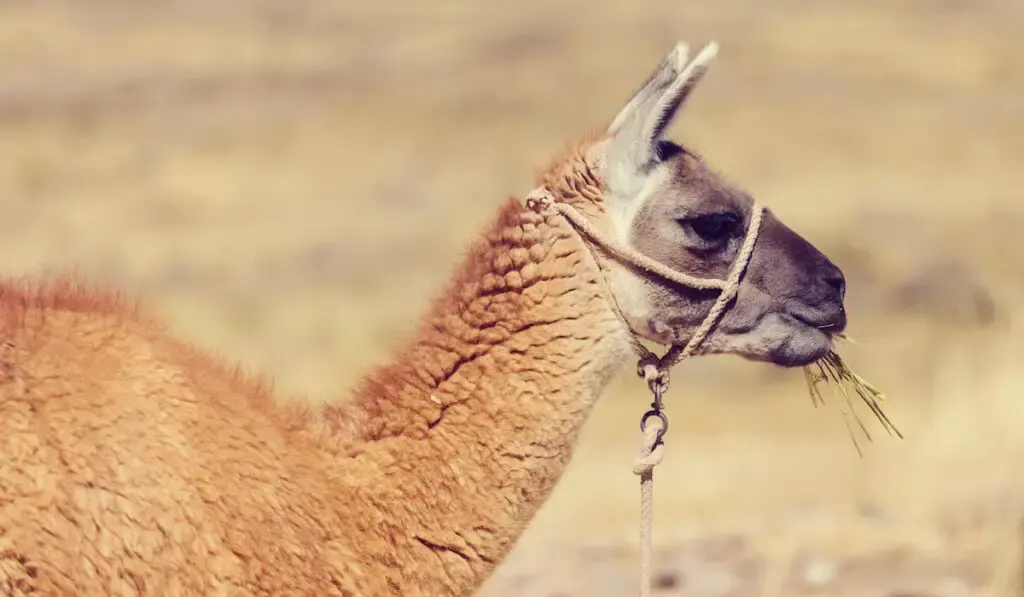
Llamas may not be a typical homestead animal, but they have more to offer than you may think.
They can be used as guard animals, the same as donkeys and sometimes they develop a stronger bond than donkeys with the livestock her they protect.
Only one llama is needed for livestock protection to keep them focused on the job at hand instead of just hanging out with other llamas.
A llama’s coat can be sheared and the fabric harvested can be spun into yarn and used to make clothing and other crafty items.
The wool or the products created can also be sold to other farms as well. Llamas are not used as a source of meat or milk on homesteads.
Llamas that have been raised around people and handled often tend to be on the friendlier side of the spectrum, but they still sometimes have a tendency to bite or kick as adults. They only need a covered shelter to get out of the rain, sun, or snow when needed.
11. Horses
Horses are extremely important for any substantially-sized homestead, especially if you have livestock to tend regularly.
Horses can be used to ride around the property to check on animals, maintain the fence, and scan for predators. Horses can live off of grass, hay, and grain.
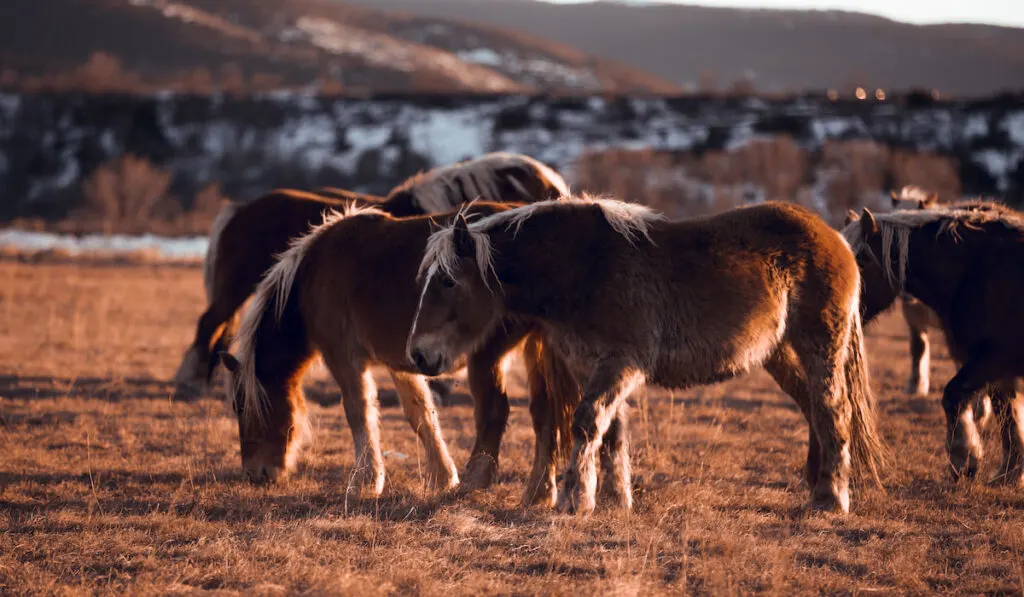
Horses do require shelter, preferably a barn of some kind, to stay safe from predators and harsh weather. In pastures, they will need a shaded area to keep cool on warm days.
Horses tend to be friendly and develop extremely strong bonds with their owners.
Horses can also be utilized around the homestead to help move materials, pull wagons, or plows to work on gardens. They require extra care and some upfront sheltering costs, but they are well worth it.
12. Cats
Domesticated cats may not be the first animals on your list for a homestead, but they definitely have their place.
Homesteads will inadvertently become a feeding ground for rodents because there are so many animals and vegetables around. Cats are the perfect solution to poison-free rodent control.
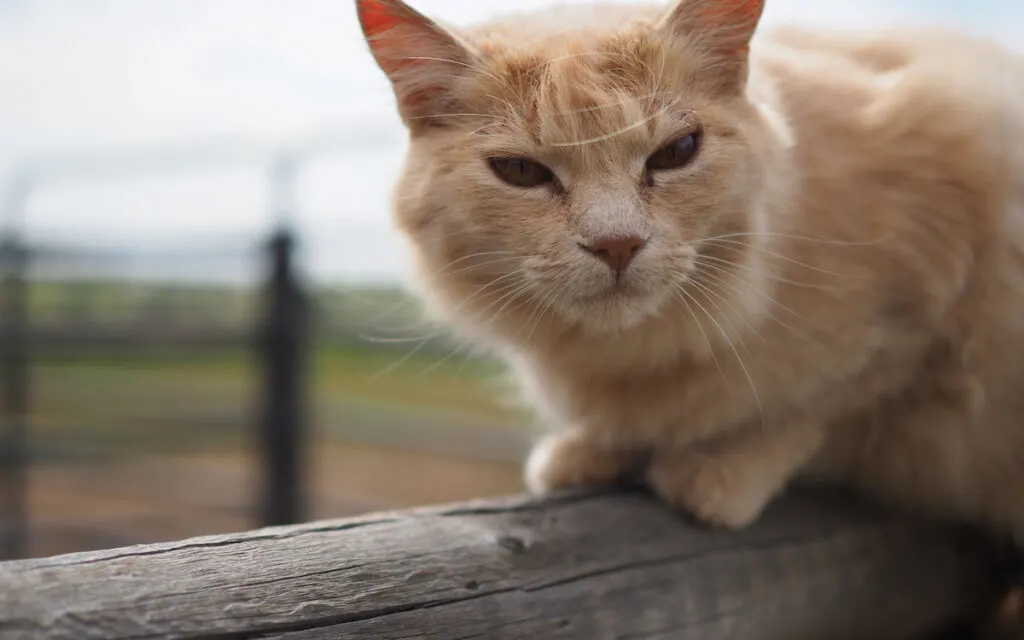
Barn cats, basically cats that live mainly outdoors, will hunt, chase, and kill rodents that try to take up residence on the property.
Cats will need a safe shelter, which can be an existing barn, tack-room, feed room, or other storage. They will need constant access to the shelter, supplemental food, and water.
Cats tend to be friendly, even if it takes them a little while to warm up to you. They should be spayed or neutered to prevent unnecessary breeding that can result in dozens of cats on your property in a few short years.
13. Dogs
Dogs are essential for homesteads not only for the company that they provide, but also for the protection.
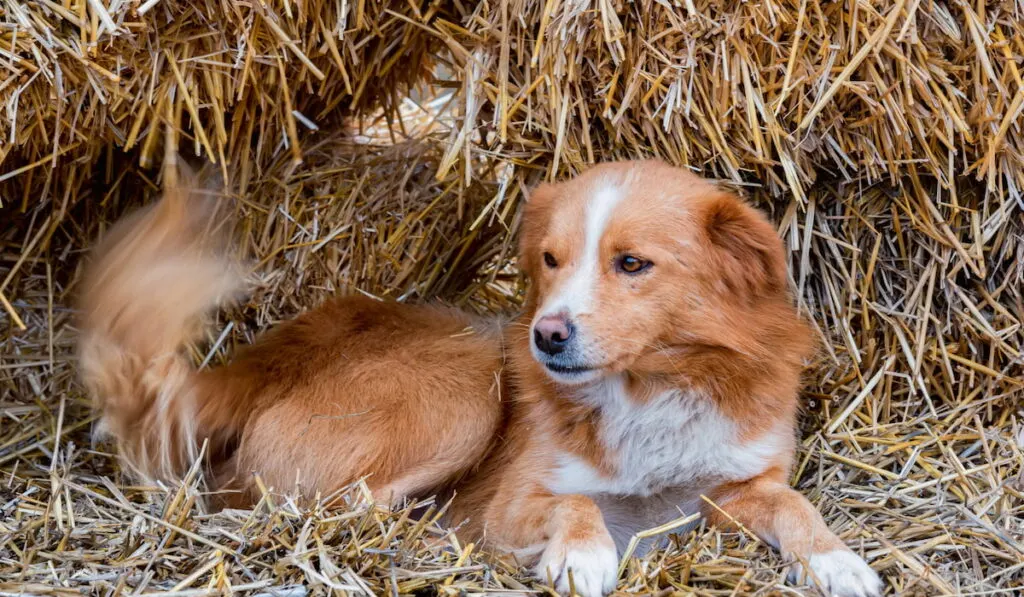
Dogs, especially livestock guard dogs, will protect their owners as well as livestock on the farm from predators like coyotes, bobcats, and bears. Just the presence of a dog is often enough to ward off some predators.
Dogs are able to sense and smell predators long before you can and they will often alert you that something sticky is afoot.
Dogs can also protect their owners from unruly livestock like bulls or llamas that get out of hand and try to attack their owners. Dogs tend to be friendly, only need a dog house as shelter, and are not hard to raise.
Final Thoughts
As long as the animals you bring home are contributing in some way to the homestead and earning their keep so to speak, then they should be a great addition.
Make sure you have some animals that contribute to your food supply, others that assist in the day-to-day work, at least one that will guard your livestock, and some that will provide a monetary income or at least have trade value.
Resources
Learning about animals that make homesteads profitable and long-lasting is the best way to decide which ones will be best for your homestead. Here are the resources used in this article.
- https://en.wikipedia.org/wiki/Sheep_milk
- https://en.wikipedia.org/wiki/Goat_milk
- https://en.wikipedia.org/wiki/Wool
- https://livestock.extension.wisc.edu/articles/how-much-meat-should-a-beef-animal-yield/
- https://www.nrcs.usda.gov/Internet/FSE_DOCUMENTS/stelprdb1167344.pdf
- https://en.wikipedia.org/wiki/Pig_farming
- https://en.wikipedia.org/wiki/Llama
